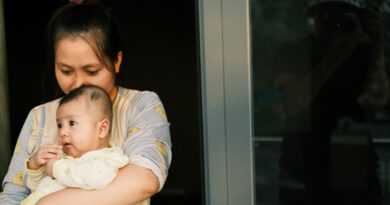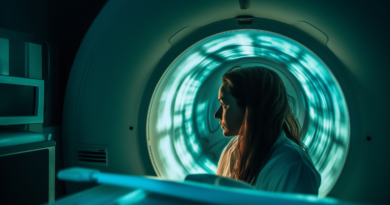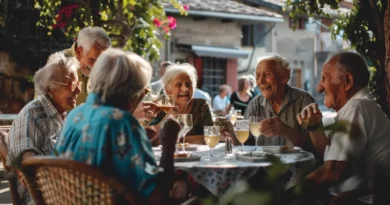Foto de ian dooley na Unsplash
Em um estudo de 1990, os participantes se lembraram de se perderem em um shopping quando crianças. Alguns compartilharam essas memórias em detalhes vívidos, mas havia um problema: nenhuma dessas pessoas havia realmente se perdido em um shopping. Elas produziram essas memórias falsas depois que os psicólogos disseram que se haviam perdido e os pais confirmaram. Então o que está acontecendo? Daniel L. Schacter explora a falibilidade de nossa memória.
| Audio | |
|---|---|
Normal | Slow |
| English Transcript | Tradução |
| In a study in the 1990s, participants recalled getting lost in a shopping mall as children. | Em um estudo na década de 1990, os participantes se lembraram de se perderem em um shopping quando crianças. |
| Some shared these memories in vivid detail - one even remembered that the old man who rescued him was wearing a flannel shirt. | Alguns compartilharam essas memórias em detalhes vívidos - um até lembrou que o velho que o resgatou usava uma camisa de flanela. |
| But none of these people had actually gotten lost in a mall. | Mas nenhuma dessas pessoas realmente se perdeu em um shopping. |
| They produced these false memories when the psychologists conducting the study told them they'd gotten lost, and although they might not remember the incident, their parents had confirmed it. | Elas produziram essas falsas memórias quando os psicólogos que conduziram o estudo disseram que elas haviam se perdido e, embora não se lembrassem do incidente, seus pais o confirmaram. |
| And it wasn't just one or two people who thought they remembered getting lost - a quarter of the participants did. | E não foram apenas uma ou duas pessoas que pensaram que se lembravam de terem se perdido - um quarto dos participantes o fez. |
| These findings may sound unbelievable, but they actually reflect a very common experience. | Essas descobertas podem parecer inacreditáveis, mas na verdade refletem uma experiência muito comum. |
| Our memories are sometimes unreliable. | Nossas memórias às vezes não são confiáveis. |
| And though we still don't know precisely what causes this fallibility on a neurological level, research has highlighted some of the most common ways our memories diverge from what actually happened. | E embora ainda não saibamos exatamente o que causa essa falibilidade no nível neurológico, a pesquisa destacou algumas das maneiras mais comuns pelas quais nossas memórias divergem do que realmente aconteceu. |
| The mall study highlights how we can incorporate information from outside sources, like other people or the news, into our personal recollections without realizing it. | O estudo do shopping destaca como podemos incorporar, sem perceber, informações de fontes externas, como outras pessoas ou notícias, em nossas lembranças pessoais. |
| This kind of suggestibility is just one influence on our memories. | Esse tipo de sugestionabilidade é apenas uma influência em nossas memórias. |
| Take another study, in which researchers briefly showed a random collection of photographs to a group of participants, including images of a university campus none of them had ever visited. | Veja outro estudo, no qual os pesquisadores mostraram brevemente uma coleção aleatória de fotografias a um grupo de participantes, incluindo imagens de um campus universitário que nenhum deles jamais havia visitado. |
| When shown the images three weeks later, a majority of participants said that they had probably or definitely visited the campus in the past. | Quando as imagens foram mostradas três semanas depois, a maioria dos participantes disse que provavelmente ou definitivamente havia visitado o campus no passado. |
| The participants misattributed information from one context - an image they'd seen - onto another - a memory of something they believed they actually experienced. | Os participantes atribuíram erroneamente informações de um contexto, uma imagem que eles viram - em outro - uma memória de algo que eles acreditavam ter realmente experimentado. |
| In another experiment, people were shown an image of a magnifying glass, and then told to imagine a lollipop. | Em outro experimento, as pessoas viram a imagem de uma lupa e, em seguida, foram instruídas a imaginar um pirulito. |
| They frequently recalled that they saw the magnifying glass and the lollipop. | Freqüentemente, elas se lembravam de ter visto a lupa e o pirulito. |
| They struggled to link the objects to the correct context - whether they actually saw them, or simply imagined them. | Elas lutaram para vincular os objetos ao contexto correto - se elas realmente os viram ou simplesmente os imaginaram. |
| Another study, where a psychologist questioned over 2,000 people on their views about the legalization of marijuana, highlights yet another kind of influence on memory. | Outro estudo, onde um psicólogo questionou mais de 2.000 pessoas sobre seus pontos de vista sobre a legalização da maconha, destaca ainda outro tipo de influência na memória. |
| Participants answered questions in 1973 and 1982. | Os participantes responderam a perguntas em 1973 e 1982. |
| Those who said they had supported marijuana legalization in 1973, but reported they were against it in 1982, were more likely to recall that they were actually against legalization in 1973 - bringing their old views in line with their current ones. | Aqueles que disseram ter apoiado a legalização da maconha em 1973, mas relataram que eram contra em 1982, eram mais propensos a lembrar que na verdade eram contra a legalização em 1973 - trazendo seus antigos pontos de vista de acordo com os atuais. |
| Our current opinions, feelings, and experiences can bias our memories of how we felt in the past. | Nossas opiniões, sentimentos e experiências atuais podem influenciar nossas memórias de como nos sentimos no passado. |
| In another study, researchers gave two groups of participants background information on a historical war and asked them to rate the likelihood that each side would win. | Em outro estudo, os pesquisadores deram a dois grupos de participantes informações básicas sobre uma guerra histórica e pediram que avaliassem a probabilidade de cada lado vencer. |
| They gave each group the same information, except that they only told one group who had actually won the war - the other group didn't know the real world outcome. | Eles deram a cada grupo a mesma informação, exceto que contaram apenas a um grupo quem realmente ganhou a guerra - o outro grupo não sabia o resultado do mundo real. |
| In theory, both groups' answers should be similar, because the likelihood of each side winning isn't effected by who actually won - if there's a 20% chance of thunderstorms, and a thunderstorm happens, the chance of thunderstorms doesn't retroactively go up to 100%. | Em teoria, as respostas de ambos os grupos deveriam ser semelhantes, porque a probabilidade de cada lado vencer não é afetada por quem realmente ganhou - se houver 20% de chance de trovoadas, e uma trovoada acontecer, a chance de trovoadas não sobe retroativamente para 100%. |
| Still, the group that knew how the war ended rated the winning side as more likely to win than the group who did not. | Ainda assim, o grupo que sabia como a guerra terminou classificou o lado vencedor como mais provável de vencer do que o grupo que não sabia. |
| All of these fallibilities of memory can have real-world impacts. | Todas essas falibilidades de memória podem ter impactos no mundo real. |
| If police interrogations use leading questions with eye witnesses or suspects, suggestibility could result in incorrect identifications or unreliable confessions. | Se os interrogatórios policiais usarem perguntas sugestivas com testemunhas oculares ou suspeitos, a sugestionabilidade pode resultar em identificações incorretas ou confissões não confiáveis. |
| Even in the absence of leading questions, misattribution can lead to inaccurate eyewitness testimony. | Mesmo na ausência de perguntas importantes, a atribuição incorreta pode levar a depoimentos imprecisos de testemunhas oculares. |
| In a courtroom, if a judge rules a piece of evidence inadmissible and tells jurors to disregard it, they may not be able to do so. | Em um tribunal, se um juiz considerar uma prova inadmissível e disser aos jurados para desconsiderá-la, eles podem não ser capazes de fazê-lo. |
| In a medical setting, if a patient seeks a second opinion and the second physician is aware of the first one's diagnosis, that knowledge may bias their conclusion. | Em um ambiente médico, se um paciente busca uma segunda opinião e o segundo médico está ciente do diagnóstico do primeiro, esse conhecimento pode influenciar sua conclusão. |
| Our memories are not ironclad representations of reality, but subjective perceptions. | Nossas memórias não são representações rígidas da realidade, mas percepções subjetivas. |
| And there's not necessarily anything wrong with that - the problems arise when we treat memory as fact, rather than accepting this fundamental truth about the nature of our recollections. | E não há necessariamente nada de errado com isso - os problemas surgem quando tratamos a memória como um fato, em vez de aceitar essa verdade fundamental sobre a natureza de nossas lembranças. |
Contagem de palavras
A tabela abaixo exibe as palavras encontradas neste vídeo, bem como o número de vezes em que aparecem.
Veja também: Para que serve esta tabela?
| Freq. | Palavra | Freq. | Palavra | Freq. | Palavra |
|---|---|---|---|---|---|
| 35 | the | 25 | of | 24 | a |
| 20 | in | 19 | they | 12 | and |
| 11 | to | 10 | not | 9 | that |
| 8 | our | 8 | actually | 7 | participants |
| 7 | memories | 6 | who | 6 | study |
| 6 | or | 6 | had | 6 | group |
| 6 | another | 5 | these | 5 | them |
| 5 | their | 5 | people | 5 | one |
| 5 | on | 5 | it | 5 | is |
| 4 | were | 4 | we | 4 | memory |
| 4 | lost | 4 | information | 4 | if |
| 4 | can | 4 | but | 3 | would |
| 3 | with | 3 | when | 3 | war |
| 3 | told | 3 | this | 3 | side |
| 3 | questions | 3 | may | 3 | mall |
| 3 | legalization | 3 | how | 3 | from |
| 3 | each | 3 | did | 3 | as |
| 2 | world | 2 | won | 2 | winning |
| 2 | win | 2 | what | 2 | was |
| 2 | visited | 2 | views | 2 | unreliable |
| 2 | two | 2 | thunderstorms | 2 | there |
| 2 | than | 2 | suggestibility | 2 | still |
| 2 | some | 2 | shown | 2 | second |
| 2 | saw | 2 | said | 2 | researchers |
| 2 | remembered | 2 | recollections | 2 | recalled |
| 2 | real | 2 | past | 2 | other |
| 2 | old | 2 | none | 2 | more |
| 2 | marijuana | 2 | magnifying | 2 | lollipop |
| 2 | likely | 2 | likelihood | 2 | leading |
| 2 | know | 2 | kind | 2 | just |
| 2 | influence | 2 | images | 2 | image |
| 2 | highlights | 2 | gotten | 2 | glass |
| 2 | getting | 2 | gave | 2 | even |
| 2 | do | 2 | current | 2 | context |
| 2 | common | 2 | chance | 2 | campus |
| 2 | bias | 2 | be | 2 | are |
| 2 | an | 2 | against | 2 | about |
| 1 | yet | 1 | wrong | 1 | witnesses |
| 1 | without | 1 | which | 1 | whether |
| 1 | where | 1 | weeks | 1 | wearing |
| 1 | ways | 1 | vivid | 1 | very |
| 1 | use | 1 | up | 1 | university |
| 1 | unbelievable | 1 | truth | 1 | treat |
| 1 | thunderstorm | 1 | three | 1 | thought |
| 1 | though | 1 | those | 1 | theory |
| 1 | then | 1 | testimony | 1 | tells |
| 1 | take | 1 | suspects | 1 | supported |
| 1 | subjective | 1 | struggled | 1 | sources |
| 1 | sound | 1 | sometimes | 1 | something |
| 1 | so | 1 | simply | 1 | similar |
| 1 | showed | 1 | should | 1 | shopping |
| 1 | shirt | 1 | shared | 1 | setting |
| 1 | seen | 1 | seeks | 1 | same |
| 1 | s | 1 | rules | 1 | retroactively |
| 1 | result | 1 | research | 1 | rescued |
| 1 | representations | 1 | reported | 1 | remember |
| 1 | reflect | 1 | recall | 1 | realizing |
| 1 | reality | 1 | rather | 1 | rated |
| 1 | rate | 1 | random | 1 | questioned |
| 1 | quarter | 1 | psychologists | 1 | psychologist |
| 1 | produced | 1 | problems | 1 | probably |
| 1 | precisely | 1 | police | 1 | piece |
| 1 | physician | 1 | photographs | 1 | personal |
| 1 | perceptions | 1 | patient | 1 | parents |
| 1 | over | 1 | outside | 1 | outcome |
| 1 | opinions | 1 | opinion | 1 | onto |
| 1 | only | 1 | ones | 1 | one's |
| 1 | objects | 1 | news | 1 | neurological |
| 1 | necessarily | 1 | nature | 1 | most |
| 1 | misattribution | 1 | misattributed | 1 | might |
| 1 | medical | 1 | man | 1 | majority |
| 1 | link | 1 | line | 1 | like |
| 1 | level | 1 | lead | 1 | later |
| 1 | knowledge | 1 | knew | 1 | jurors |
| 1 | judge | 1 | ironclad | 1 | into |
| 1 | interrogations | 1 | incorrect | 1 | incorporate |
| 1 | including | 1 | incident | 1 | inadmissible |
| 1 | inaccurate | 1 | impacts | 1 | imagined |
| 1 | imagine | 1 | identifications | 1 | historical |
| 1 | him | 1 | highlighted | 1 | have |
| 1 | has | 1 | happens | 1 | happened |
| 1 | groups' | 1 | groups | 1 | go |
| 1 | fundamental | 1 | frequently | 1 | flannel |
| 1 | first | 1 | findings | 1 | felt |
| 1 | feelings | 1 | false | 1 | fallibility |
| 1 | fallibilities | 1 | fact | 1 | eyewitness |
| 1 | eye | 1 | experiment | 1 | experiences |
| 1 | experienced | 1 | experience | 1 | except |
| 1 | evidence | 1 | ever | 1 | ended |
| 1 | effected | 1 | does | 1 | diverge |
| 1 | disregard | 1 | diagnosis | 1 | detail |
| 1 | definitely | 1 | courtroom | 1 | could |
| 1 | correct | 1 | confirmed | 1 | confessions |
| 1 | conducting | 1 | conclusion | 1 | collection |
| 1 | children | 1 | causes | 1 | by |
| 1 | bringing | 1 | briefly | 1 | both |
| 1 | believed | 1 | because | 1 | background |
| 1 | aware | 1 | asked | 1 | arise |
| 1 | anything | 1 | answers | 1 | answered |
| 1 | although | 1 | all | 1 | accepting |
| 1 | absence | 1 | able |











Excelente